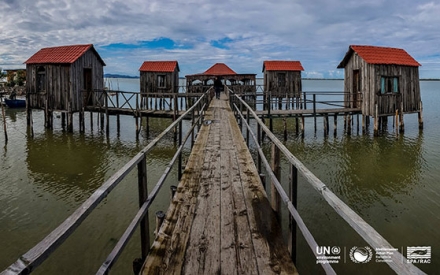Search
11/20: Patok-Rodoni Bay under the magnifying glass of scientists to assess its status
A field survey to assess the environmental status of the Bay of Patok-Rodoni in Albania has just been completed by UNEP/MAP-SPA/RAC within the framework of GEF Adriatic project and the Integrated Monitoring and Assessment Programme (IMAP) implementation.
As a reminder, the GEF Adriatic project aims to support Maritime Spatial Planning (MSP) throughout the Adriatic region as a tool for sustainable development. It’s the first initiative of its kind, embedding national IMAPs developed within the Barcelona Convention into MSP to achieve Good Environmental Status of the Mediterranean Sea. The project is implemented in Albania and Montenegro by the UNEP/MAP Coordinating Unit with PAP/RAC and SPA/RAC.
The surveyed area of Patok-Rodoni Bay covers approximately 90 km2. It includes the Cape of Rodoni and the Rodoni Bay. The area is known for its relevant biodiversity, and it includes a 50 km² protected area in the coastline; but it is also impacted by several human activities and is strongly influenced by water exchanges with Patok Lagoon and the inflows from the river of Ishmi and Mat.
● Marine habitats of the Bay of Patok-Rodoni
The study carried out focused in particular on certain indicators of the IMAP Ecological objectives related to biodiversity, hydrology, contaminants and marine litter. The experts from the Genc Myftiu company, hired by SPA/RAC for the survey, employed various techniques. They used the Remote Operated Vehicle (ROV) and sonar, carried out sampling of water, biota and sediments and collected physico-chemical and biological data. The experts held also interviews with fishers.
● Field survey held in the Bay of Patok-Rodoni
On the job-training was organized alongside the study to enable students and national stakeholders to exchange with the experts and to know the techniques and methodologies used for the survey. This training was jointly organized by the National Agency for Protected Areas (NAPA) of the Ministry of Tourism and Environment, SPA/RAC and PAP/RAC
● On the job-training for students
Data analysis and laboratory work are underway. The next step will be to assess the levels of pressure on the environment and to identify the most fragile areas of Patok-Rodoni Bay, to finally affine the IMAP national programme within the area and propose measures allowing the preservation of fragile marine areas and the development of sustainable economic activities.
The SPA/RAC will continue providing its assistance to the Contracting Parties to the Barcelona Convention to fill in the gaps in terms of biodiversity monitoring and assessment, despite the constrains that Covid-19 is generating at environmental, social and economic level in the world and in the Mediterranean.
Photo by Simone Modugno for ©SPA/RAC













Find Us On...